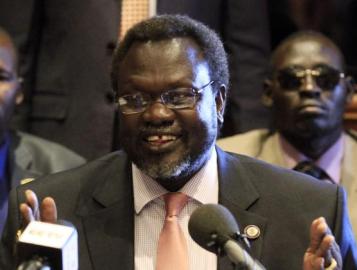Machar says “stupid” comment should not stall peace talks
June 19, 2014 (ADDIS ABABA) – The South Sudanese ex-vice president turned rebel leader, Riek Machar, said the recent “stupid” comment allegedly uttered by the executive secretary of the East African regional bloc (IGAD), Mahboub Maalim, should not be made as an excuse to stall the peace process to settle the six-month conflict in the new nation.

In reaction the government’s delegation suspended their participation in the talks and president Kiir personally wrote a letter of protest to the IGAD chairman, the Ethiopian Prime Minister Hailemariam Desalegn, asking for apology on behalf of his junior official.
South Sudanese armed opposition leader, Machar, who dismissed being stupid equally said the comment was “unfortunate”, but said it should have been overcome and not affect the peace process.
“I have not been known for being stupid,” he said in a BBC interview this week.
“That reference was very unfortunate and I would have thought Mahboub would apologise and we would continue with the peace process,” he further stressed.
The rebel leader, who in 1982 obtained his PhD in Strategic Planning in the University of Bradford in UK, said the war was imposed on him by the dictatorship and its subsequent crisis which he said was orchestrated by president Kiir using a “fake coup.”
He however added the conflict would politically be settled in a peace agreement that would restructure the state on the basis of a federal system.
The remarks have attracted public reactions with many wondering how the South Sudanese war became particularly stupid when many IGAD countries have had internal wars in the past and present.
In a press release, dated 19th June 2014, seen by Sudan Tribune, addressed to the IGAD mediation team, the deputy spokesperson of the SPLM/A in Opposition, Mabior Garang de Mabior, said the rebels were ready to continue with the peace talks while their concerns on inclusivity are being addressed by the mediators.
“However, we want to express our readiness to continue direct negotiations with the government delegation while you address the issues we have raised in our letter. In addition, we want to reiterate our commitment to inclusivity of other stakeholders by engaging them in consultative manner as stipulated in the May 9, 2014, Agreement,” partly reads the statement.
The two rival factions have agreed to negotiate a peace agreement that will lead to formation of an interim government within the next two months. The negotiations are inclusive of the other South Sudanese stakeholders.
OPPOSITION DEMAND FAIR INCLUSIVITY
Machar however demanded fair inclusivity in the IGAD peace process and criticized the manner in which the selection processes were done for the civil society and faith-based groups that are to join the talks.
Machar said the “victims” who want change in the country have been left out when the delegates were mainly selected from the government-controlled areas without considering those who fled abroad, demanding that the process be reviewed.
“Those who felt things are not right and want a peace agreement and a change in the government structures are the ones abroad. They are the victims,” he pointed out.
He explained that those who remained in Juba and lived without coercion for the last six months of violence were probably pro-government groups and shouldn’t be seen to represent the divergent views in the peace talks.
The rebel leader further argued that while it was right to bring civil society organizations from the government’s side, it was equally important and right to select from the civil society groups that have fled the country and live abroad.
(ST)
